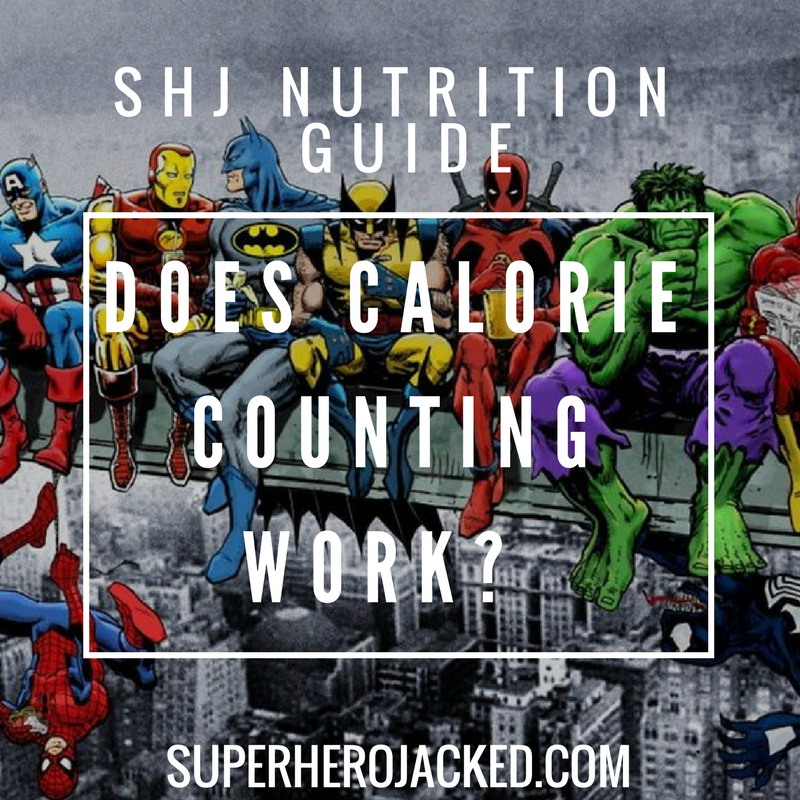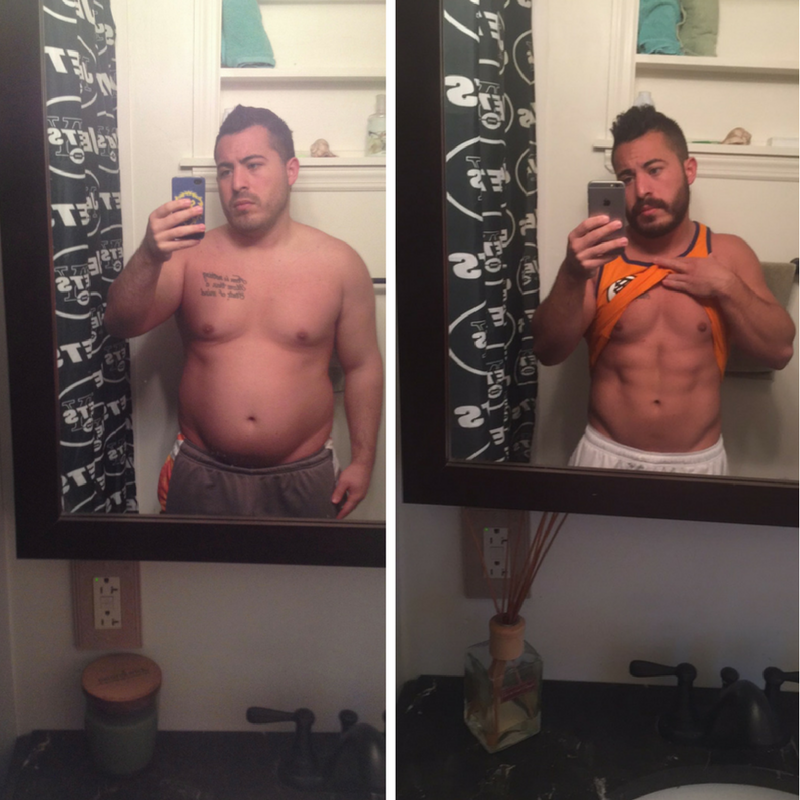Last updated on June 25th, 2022 at 07:32 am

We’re about to wander into one of the biggest nutrition “solutions” and dietary fads that has ever strolled around.
Is that too bold of a statement?
Well, either way, I feel like I’m allowed to say it based on that fact that I’m part of the hype.
I think it holds strong value.
I don’t think it just doesn’t work and it’s wrong…
I’m actually not even trying to prove it wrong in this article.
What I know though is….it’s not a perfect system, and there are a lot of things that play a factor into these magic numbers that everyone thinks they have…
But, okay, let’s not get ahead of ourselves.
What are we even talking about?
Calorie Counting
Although, I’m sure you could tell from the title of this article, right…?
Before we get too far here’s what I’d like to break down first:
- What is Calorie Counting?
- Very brief overview of the concept of calorie counting
- What are we discussing here?
- A brief description of what we’re going to cover in this article (obviously).
- What are we trying to accomplish by discussing this?
- I want to give you my main points and the reasons for this discussion before we go any further than that. So, stay tuned.
Now that you have a quick breakdown of our introduction, let’s get right into it.
What is calorie counting?
I’ll give you the rundown in my own words to make it as simple and quick as possible.
Like pulling off a band-aid (if I’d ever just get on with it).
1…..2…..
Calorie counting is the idea that everyone has a maintenance level (aka BMR/Base Metabolic Rate calculated with TEE/Total Energy Expenditure) of calories (a specific amount of calories that, if you ate every day, would keep you at the same exact weight). This is gathered by knowing how many calories your body burns daily based on numerous things (which we’ll talk about later).
Now, knowing that, and knowing that a pound is equal to 3500 calories, calorie counting is the concept of staying above or below your daily caloric maintenance level in order to gain or lose weight.
Simple enough, huh?
They even freakin’ make calorie counters that tell you exactly what you need to eat!
What are we discussing here?
What we’re talking about are the things that get in the way of this so-called surefire way to lose or gain weight.
It’s just not that simple.
There are so many complications with this method and I want you all to know about them before starting your journey.
Which leads me to what we’re trying to accomplish…
What I want to make clear is that while calorie counting holds value, it’s more important to build awareness of what you’re eating, how much you’re eating, and the pillars you’re using to maintain the sustainable diet you’re trying to create to reach your goals.
Hold on to that mouth-full, we’ll be using it throughout the entire article.

Complication One: It’s Impossible To Find A Specific Individual’s Exact Maintenance Level Calories
Well, yeah…that sounds like a big problem…
Let me get started by saying this: I used the Flash’s picture above for a reason. His metabolism and his caloric intake are going to be MUCH different than someone else whose height and weight are the same.
Yeah, I’m talking about this: All the programs that say MALE, 5’10, 185 = XXX Calories…and then rinse and repeat the same process for every height, gender, and weight…
And sure, we can begin to calculate activity level as well, but how accurate could that be?
Let’s find out.
In a conversation with Dr. Perlmutter (author of Grain Brain, and Brain Maker and more), and Dr. David Lugwig, one quote specifically sticks out for us to utilize.
Here’s what Dr. Lugwig has to say about calorie counting:
The calorie balance model is so deeply entrenched in our culture and mindset. I can put two nails in the coffin of that concept. First, not even the most expert dietitian can accurately assess calorie balance to within 350 a day. You just can’t do it without elaborate machinery. If you were off by 350 calories a day, you would go from lean to massively obese in about five years. Nail number two is: if calorie balance were so important to maintaining a healthy weight, how did humans avoid massive obesity before the very concept of calorie balance was created?
And yes…
I absolutely start with this quote specifically because it talks about multiple complications with calorie counting that we need to be aware of.
This is a big point that’s going to be intertwined throughout the article, so don’t pass out: there are more ways that make it so hard to know exactly how much you’d have to eat every single day…
But for now, let’s move on to point number two.

Complication Two: It’s Also Impossible To Find A Specific Food’s Exact Amount Of Calories
This one is a fun one.
I like that we’re not only making it impossible to calculate our bodies caloric intake, but also the caloric intake of what’s going into it.
Oh, right…the two main…wait…ONLY aspects of this whole equation…and we can’t calculate EITHER perfectly?!
Say…WHHATTTTTT!?!?
Alright. I have someone that can explain this in a two minute clip that’ll make this nice, and much easier.
Check this out:

Not to mention the fact that they can be based on different foods altogether (or just completely miss-marked and unnoticed).
So what does that mean?
Ah, glad you asked.
That means that it’s nearly impossible to figure out how much you NEED to eat and how much you ARE eating….
So if you can easily be 350 calories off your maintenance level, and also 350 calories off what you’re eating, we’re immediately looking at up to a 700 calorie window, which is also equivalent to a pound every 5 days that is unaccounted for in some way.
The next thing people might say is this:
“Well, I’ll just weigh out every single piece of food I eat so that I can actually know the caloric intake of each.”
And, okay. Valid, to an extent.
BUT, we already talked about the fact that you can’t know YOUR specific intake anyways, and even if you could, that’s just not sustainable at all. Sustainability, along with awareness are among the main points of this article.
I hate to do this to you, but it’s time to move on to the next point…

Complication Three: Hormones And Metabolism Play A Factor In Your Daily Caloric Intake
We kind of talked about this a bit.
I mentioned The Flash, and how his metabolism is clearly different than mere peasants like us.
And, there’s not a specific way we can easily go about deciphering it other than guessing at our activity level and hoping that our hormonal response and metabolism fall in that exact range.
These are just more things adding onto Dr. Ludwig’s initial point.
In an article in WebMd, Dr. Bowden PhD, CNS, a board-certified nutritionist (and author of Living the Low Carb Life: Choosing the Diet that’s Right for You from Atkins to Zone, and The 150 Healthiest Foods on Earth: The Surprising, Unbiased Truth About What You Should Eat and Why) discusses the history of calorie counting, and then proceeds to tell us this later in the article:
“Food produces hormonal effects in the body,” he says. “Some hormones say ‘store that fat’; others say ‘release sugar’; others say ‘build muscle.’ Study after study shows that diets based on the same amount of calories, but different proportions of fat, protein and carbohydrates, result in different amounts of weight loss.”
Well, I’ll be damned.
And now you’re probably saying “well, I’ll also count my macros, DUH!”, but hey, we already debunked that in the “specifics are impossible to calculate” points above, and we’ll continue with more.
James LaValle, clinical pharmacist, board certified clinical nutritionist and author of Cracking the Metabolic Code, tells BuzzFeed this in an article about calorie counting:
“The thing about your metabolism is that there’s a lot of factors going into how efficiently you’re taking in calories and burning them, and now we’re finding out that the kind of calories you’re taking in are also important. The more nutrient dense and less calorically dense with your diet, the better off you’ll be. If you’re choosing the wrong foods, and you’re not getting the nutrients you need, you lead your body to a process over time of chronic inflammatory signaling that alters your metabolism.”
Great. There’s that damn metabolism again.
Who invited this guy?
Oh, but it gets better. Here’s more from LaValle and that article:
Lack of sleep and chronic stress are two big ones, LaValle says. Research shows that when you don’t get enough sleep, your body naturally craves high-calorie, high-fat foods. And stress can also cause food cravings. Both of these things can make counting calories and making healthy food choices much, much harder.
So, that one may not specifically be debunking calorie counting, we can go a bit deeper.
In another WebMd article I pulled this for us:
Sleep deprivation makes you “metabolically groggy,” University of Chicago researchers say. Within just 4 days of insufficient ZZZs, your body’s ability to process insulin — a hormone needed to change sugar, starches, and other food into energy — goes awry. Insulin sensitivity, the researchers found, dropped by more than 30%.
The point is, there are so many things that can effect your body aside from just calories and macros. The different types of food you’re eating, stress, sleep, other hormones, metabolism, and more.
But, alright, let’s take another look at an Adam Ruins Everything clip because he’s amazing.
Oh, and it makes the stress of a sustainable diet so damn important.

Talk about counter productive.
But, the point is: your metabolism can change drastically from certain things, making another point in why it’s nearly impossible to know how many calories you need each day, but also building on the many factors that change how your body reacts to these calories.

Complication Four: More Factors That Can Change How Our Body Reacts…Like “Gut Health”
The Blobs gut looks pretty healthy…
Just ask Wolvie.
This complication is more of a bonus.
I just want to let you know that there are other things going on in your body that affect the way you gain and lose weight (and fat).
Let’s look at an article from Scientific America about gut health entitled “How Gut Bacteria Help Make Us Fat And Thin”.
I have two larger quotes I want to share with you that break it down.
Here’s the first of those quotes about studies done by Dr. Jeffrey Gordon and his colleagues:
To demonstrate cause and effect, Gordon and his colleagues conducted an elegant series of experiments with so-called humanized mice, published last September in Science. First, they raised genetically identical baby rodents in a germ-free environment so that their bodies would be free of any bacteria. Then they populated their guts with intestinal microbes collected from obese women and their lean twin sisters (three pairs of fraternal female twins and one set of identical twins were used in the studies). The mice ate the same diet in equal amounts, yet the animals that received bacteria from an obese twin grew heavier and had more body fat than mice with microbes from a thin twin. As expected, the fat mice also had a less diverse community of microbes in the gut.
And it gets even better.
Here’s another one:
Gordon’s team then repeated the experiment with one small twist: after giving the baby mice microbes from their respective twins, they moved the animals into a shared cage. This time both groups remained lean. Studies showed that the mice carrying microbes from the obese human had picked up some of their lean roommates’ gut bacteria—especially varieties of Bacteroidetes—probably by consuming their feces, a typical, if unappealing, mouse behavior. To further prove the point, the researchers transferred 54 varieties of bacteria from some lean mice to those with the obese-type community of germs and found that the animals that had been destined to become obese developed a healthy weight instead. Transferring just 39 strains did not do the trick. “Taken together, these experiments provide pretty compelling proof that there is a cause-and-effect relationship and that it was possible to prevent the development of obesity,” Gordon says.

If none of this blows your mind…well I just don’t know what will.
Like I said, this is just a topic that is more-so a bonus to show you how many factors there really are that come into play when trying to gain and lose weight [and fat, and muscle].
But, I think that’s enough talking about the complications, and time to move on to what we can do with this knowledge.
What Can We Do Knowing These Things? Does Calorie Counting Work?
Great questions.
Like I said earlier in the article, the main point of knowing all this is to create awareness and hopefully use this to find the most sustainable dietary guidelines for you that allow you to not only reach your goal, but also live a healthy and SuperHuman life.
AKA: look great, feel great, and possibly save people in the process.
The concept of calorie counting does work.
If you stay under your calories you will lose weight.
If you stay above your calories you will gain weight.
The problem is that it’s not that simple.
There are other factors (which we’ve now become aware of) that come into play and mess everything up.
One thing I liked that Ludwig said in an earlier quote we looked at is this:
Nail number two is: if calorie balance were so important to maintaining a healthy weight, how did humans avoid massive obesity before the very concept of calorie balance was created?
And, unfortunately, I think calorie counting is an easy way to say “Well, I can eat junk food more often because I’m still in my caloric range”….
Actually, I know for a fact that’s one of the appealing points.
It just doesn’t work that way.
You WILL lose weight if you’re drastically lowering your caloric intake, but you’ll also be changing your metabolism and putting yourself in an unsustainable hole, therefore it’s better to lose weight at a slower pace, or with a cleaner, more sustainable approach.
The same can obviously be said if you drastically increase your caloric intake.
Not just that, but your body can only utilize so much of a surplus or negative before you’re either tacking on fat storage (when bulking) and losing muscle mass (when cutting).
But, that’s a whole different ball game that could have its own article…

But…What CAN We Do?
Ah ha. Now we’re getting to the good stuff.
In that BuzzFeed article we took a look at before they were discussing different ways different foods effect our metabolism and said that what we can take from it is this:
Eat lots of vegetables. Limit your carbohydrate intake, and choose complex carbohydrates over simple carbs. And, as he said, choose foods with a LOT of nutrients per calorie — so, typically whole foods, lots of produce, foods with protein, fiber, and healthy fats to help you feel full for longer and minimize cravings, and as little added sugar as you can manage.
Oh, so eat healthy even though a calorie is just a calorie?
Who would have thought….?
What I want to build on is the fact that we need to still be eating nutrient dense foods. I love seeing guys that promote calorie counting that are ALSO preaching this to people, because that’s what is going to make it work. It’s another pillar on top of the calorie counting that is what is allowing it be so successful.
That’s exactly why we utilize different nutrition pillars at SHJ and inside The Academy to create the most sustainable diets in the process.
Let’s dive into that a little deeper, actually.
In the picture I just shared you can see that I lost over 50 lbs in my transformation.
You can read more about that on my about page (which I talk about all my training, aka skinny to bulking, bulking and six pack to obese, and then weight loss), OR go to a zoomed in transformation story about how I lost all the weight here.
Did I count calories?
The answer is no.
Was I, however, aware of how much I was eating of each specific macro?
Yup.
I know what foods have what calories (or a round-about anyways), and I’m aware that everyday I’m getting in a range of 150-180g of protein, staying under 50g (ish) of carbs (sometimes it’s much lower, sometimes it’s a little higher), and my fat tends to stay a bit higher, but falls into place because I know the general range of calories I’m eating eat day overall.
But, how the hell does that work?
Well, I’m using pillars that I know are healthy, and ALSO great for a hormonal response (stress hormones, testosterone, etc.), my metabolism, AND my health.
That’s a dang triple whammy if you ask me.
Oh, and the best part?
Part of it is including the fact that I believe everyone needs a cheat meal (aka needs to remember we’re all human) in order to stay sustainable.
So, I built in a way for cyclical ketosis, AKA carb reloading to give us that cheat meal in a meaningful way each week (assuming you’re following the rest of the pillars).
Out of the near 200 celebrities I’ve now researched, I’ve found that the majority are with me on this cheat meal topic.
They’re all humans too.
Let’s wrap it up.
We can still use calorie counting. It does hold value. But, it’s not precise. So, we’re going to have to use awareness of the amount of calories (and macro-nutrients) we’re eating each day (which definitely does not have to be absolutely precise and to an exact number), in conjunction with nutrition pillars that keep us healthy, inherently burn fat, boost our metabolism, give us a great hormonal response, AND are sustainable for our lives.
Say that all five times fast…
And, if you’re interested in a dietary plan that does just that, you can check out our pillars on the site (and ask me for help combining them at any point), or use the official guidelines in The Academy with tons of other SuperHumans.
#####
Mike
SHJ’s Nick Fury

SUPERHUMAN SECRETS V.2
NOW UPDATED AND EXPANDED WITH A NEW SECTION & SEVEN BONUSES
USD$29 USD$14.95


